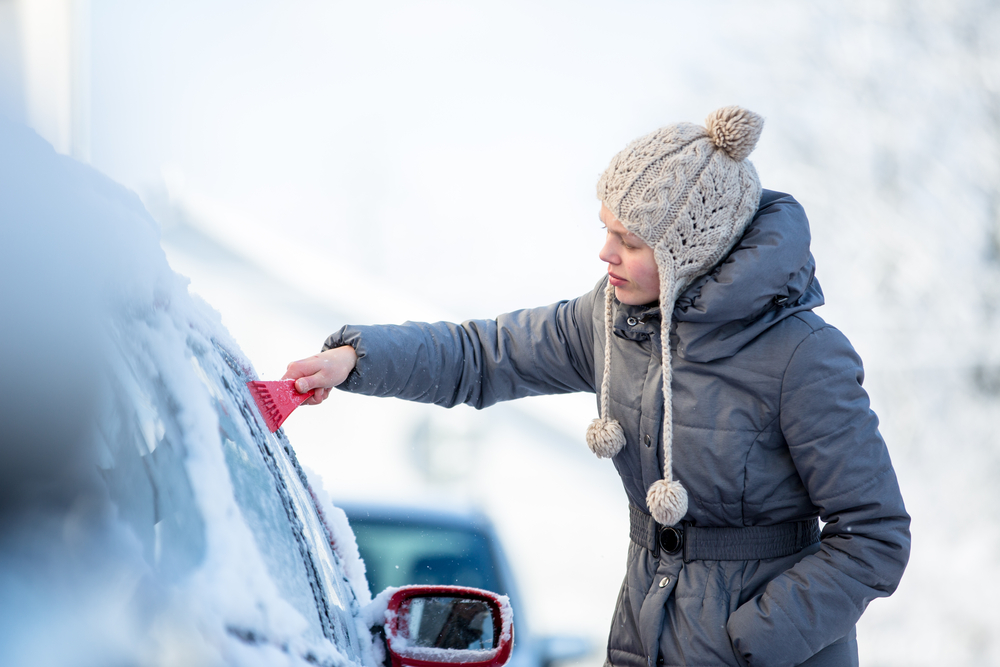It’s that time of year again – the dreaded dust the snow off your car, scrape the ice off the glass, warm up for 10 minutes, freeze while doing so, and then slip and slide all the way to your destination. Does this sound familiar? They’re the winter challenges we all know only too well, and we’re gearing up to head straight into the thick of it.
While many of us complain about the woes of winter, there are ways we can make it a bit of a better experience, and all it takes is some preparations to get your car ready for winter. Here are 5 tips for getting your car ready for winter this season.
Emergency Supplies
A precaution that most of us tend to ignore or forget about is packing an emergency kit in our cars. While we assume we most likely won’t need it (and often times we’re right), having a kit with you can seriously help you out when you least expect it. Some things that your kit should include are a first aid kit, bottled water, health bar, gloves, boots, and an extra winter coat. In addition to emergency items for yourself and your passengers, your kit should be stocked with supplies and gear for your vehicle.
This includes booster cables, extra oil and windshield washer fluid, lock de-icer, a flashlight, flares or safety triangles, an ice scraper, a shovel, a bag of salt or gravel, and chains for your tires.
Winter Tires
Be proactive in installing your winter tires early. Even if you drive a Ford Mustang or another powerful vehicle, they are still essential. As soon as the temperatures hit below 10 degrees Celsius, you can go ahead and get your winter tires put on. The weather can be incredibly unpredictable in transition seasons, and you’d rather be safe than sorry. The special rubber on winter tires allows them to stay flexible in cold weather and gives them the ability to grip snow and ice for optimum traction.
To maintain your tires, be sure to check the air pressure in all four of them, including your spare tire. Cold air has the ability to significantly lower air pressure levels, hindering your car’s capability of traction on snow and ice. When you’re filling up gas, do a quick check on your tires, and if they seem low, you can fill them up with air at the gas station.
Fluids
The winter season is one of dirt, precipitation, and low visibility. Topping up all the fluids that your car needs to run on is wise. This includes windshield washer fluid, gas, engine coolant (antifreeze), and oil.
You should always have at least half a tank of gas in your car at all times in the winter. Traffic jams, accident hold-ups, idling, warming up your car, and other unforeseen circumstances are a much bigger possibility during the winter, so it’s best to not get caught without a substantial amount of petrol.
Due to all the sleet and backsplash from other cars on the road, our windshields tend to get dirtier much quicker and more frequently than in the summer. Driving with low visibility due to low washer fluid levels is extremely unsafe. Make sure your car is always topped up.
Wipers
It’s no big secret than driving in the winter without working wipers is a hazard in the extreme. They are your saviors during downpours, snowfall, and blizzards, not to mention in helping you clear off backsplash from other vehicles in high-speed zones. The buildup of ice and snow on your wipers, in addition to the rubbing action against the grit, wears down the quality of your wipers over time. It is advised that you change your wipers yearly, if not twice a year, especially after a particularly harsh winter.
Battery
An often overlooked, but the extremely important item in your car is your battery. Before the winter season is in full swing, have your battery checked for its condition – will it get your car through the winter? The last thing you’d want to do is attempt to jumpstart your car in the dead of winter. The average lifetime of a car battery is around four years, so if yours is approaching or near that deadline, have it looked at for safety.
Your car should be in optimal shape this winter if you follow these 5 tips.

